Related Research Articles

The history of South Korea begins with the Japanese surrender on 2 September 1945. At that time, South Korea and North Korea were divided, despite being the same people and on the same peninsula. In 1950, the Korean War broke out. North Korea overran South Korea until US-lead UN forces intervened. At the end of the war in 1953, the border between South and North remained largely similar. Tensions between the two sides continued. South Korea alternated between dictatorship and liberal democracy. It underwent substantial economic development.
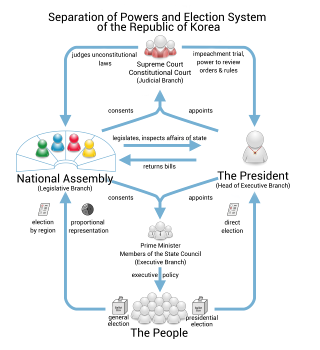
The politics of South Korea take place in the framework of a presidential representative democratic republic, whereby the president is the head of state, and of a multi-party system. To ensure a separation of powers, the Republic of Korea Government is made up of three branches: legislative, executive, and judicial. The government exercises executive power and legislative power is vested in both the government and the National Assembly. The judiciary is independent of the executive and the legislature and comprises a Supreme Court, appellate courts, and a Constitutional Court.

The president of the Republic of Korea, also known as the president of South Korea (Korean: 대통령), is the head of state and head of government of the Republic of Korea. The president leads the State Council, and is the chief of the executive branch of the national government as well as the commander-in-chief of the Republic of Korea Armed Forces.
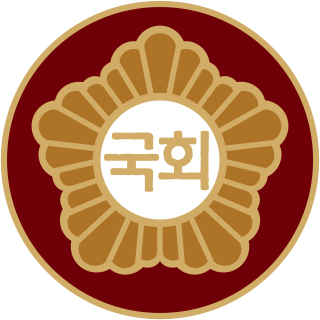
The National Assembly of the Republic of Korea, often shortened to the National Assembly, is the unicameral national legislature of South Korea. Elections to the National Assembly are held every four years. The latest legislative elections was held on 10 April 2024. The National Assembly has 300 seats, with 253 constituency seats and 47 proportional representation seats; 30 of the PR seats are assigned an additional member system, while 17 PR seats use the parallel voting method.

The prime minister of the Republic of Korea is the deputy head of government and the second highest political office of South Korea who is appointed by the President of the Republic of Korea, with the National Assembly's approval. The prime minister may be a member of the National Assembly, but this is not required to hold the office. The prime minister of South Korea is not the head of government of South Korea, for the President is both the head of state and government in the country.
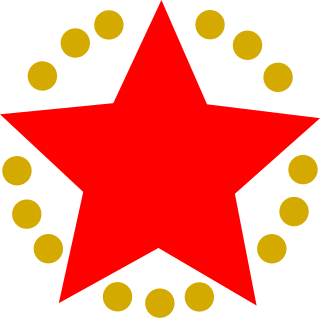
The Supreme People's Assembly is the legislature of North Korea. It is ostensibly the highest organ of state power and the only branch of government in North Korea, with all state organs subservient to it under the principle of unified power. However, in practice it is widely considered to be a rubber stamp legislature which exists to approve decisions made by the ruling party as a formality, and which has little to no real power of its own.

The Parliament of Pakistan is the supreme legislative body of the Islamic Republic of Pakistan. It is a bicameral federal legislature, composed of the President of Pakistan and two houses: the Senate and the National Assembly. The president, as head of the legislature, has the power to summon or prorogue either house of the Parliament. The president can dissolve the National Assembly, only on the Prime Minister's advice.

Han Seung-soo is a South Korean politician and diplomat. He served as Prime Minister of the Republic of Korea from 29 February 2008 to 28 September 2009. He was the United Nations Secretary-General Ban Ki-moon's Special Envoy on Climate Change (2007–08) and for Disaster Risk Reduction and Water (2013–18), Special Advisor to the UN/World Bank High-Level Panel on Water (2016–18), Member of the UN Secretary-General's Advisory Board on Water and Sanitation Agency, Member of the UN Secretary-General's High-Level Panel for Global Sustainability, Founding Chair of Global Green Growth Institute, Temasek International Panel Member (2004–18) and Independent Non-Executive Director of Standard Chartered plc (2010-2019).

The Korean Provisional Government (KPG), formally the Provisional Government of the Republic of Korea, was a Korean government in exile based in China during the Japanese occupation of Korea.

Constitutional Assembly elections were held in South Korea on 10 May 1948. They were held under the U.S. military occupation, with supervision from the United Nations, and resulted in a victory for the National Association for the Rapid Realisation of Korean Independence, which won 55 of the 200 seats, although 85 were held by independents. Voter turnout was 95%.

The Fifth Republic of South Korea was the government of South Korea from March 1981 to December 1987.
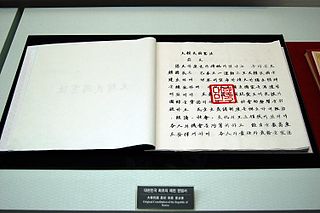
The Constitution of the Republic of Korea is the supreme law of South Korea. It was promulgated on July 17, 1948, and last revised on October 29, 1987.

The Olympic Council of Asia (OCA) is a governing body of sports in Asia, currently with 45 member National Olympic Committees. Talal Fahad Al-Ahmad Al-Sabah was elected as President of the OCA on 8 July 2023. However, on 30 July 2023, the International Olympic Committee (IOC) asked Randhir Singh, who was previously the acting president, to continue as the Acting President of the OCA, while the IOC investigated the OCA presidential election of 2023. On 13 October 2023, the IOC ethics committee asked the OCA to annul its 2023 elections due to Talal’s candidacy not fulfilling the eligibility conditions defined by the OCA Constitution and election interference by his brother Ahmad Al-Fahad Al-Sabah.

The Constitutional Court of Korea is one of the highest courts—along with the Supreme Court—in South Korea's judiciary that exercises constitutional review, seated in Jongno, Seoul. The South Korean Constitution vests judicial power in courts composed of judges, which establishes the ordinary-court system, but also separates an independent constitutional court and grants it exclusive jurisdiction over matters of constitutionality. Specifically, Chapter VI Article 111(1) of the South Korean Constitution specifies the following cases to be exclusively reviewed by the Constitutional Court:
- The constitutionality of a law upon the request of the courts;
- Impeachment;
- Dissolution of a political party;
- Competence disputes between State agencies, between State agencies and local governments, and between local governments; and
- Constitutional complaints as prescribed by [the Constitutional Court] Act.

The Socialist Constitution of the Democratic People's Republic of Korea is the constitution of North Korea. It was approved by the 6th Supreme People's Assembly at its first session on 27 December 1972, and has been amended and supplemented in 1998, 2009, 2012, 2013, 2016, 2019 (twice), and in 2023. It replaced the country's first constitution which was approved in 1948.

The President of the State Affairs Commission of the Democratic People's Republic of Korea, alternatively styled "President of State Affairs" in official translations, is the supreme leader and head of state of North Korea. The president chairs the State Affairs Commission (SAC), which is the highest leadership institution in North Korea, and serves as the commander-in-chief of the North Korean armed forces.

The National Defence Commission of the Democratic People's Republic of Korea (NDC) was the highest state institution for military and national defence leadership in North Korea, which also served as the highest governing institution of the country from 1998 until 2016 when it was replaced by the State Affairs Commission.
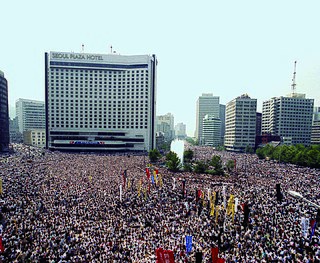
The June Democratic Struggle, also known as the June Democracy Movement and the June Uprising, was a nationwide pro-democracy movement in South Korea that generated mass protests from June 10 to 29, 1987. The demonstrations forced the ruling government to hold direct presidential elections and institute other democratic reforms, which led to the establishment of the Sixth Republic, the present-day government of South Korea.
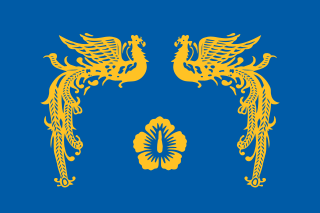
The State Council of the Republic of Korea is the chief executive body and national cabinet of the Republic of Korea involved in discussing "important policies that fall within the power of the Executive" as specified by the Constitution. The most influential part of the executive branch of the government of South Korea are the ministries.
References
- ↑ "Past Members - The 12th National Assembly (April 11, 1985~May 29, 1988)". National Assembly . Retrieved 12 October 2019.
- ↑ – via Wikisource.
